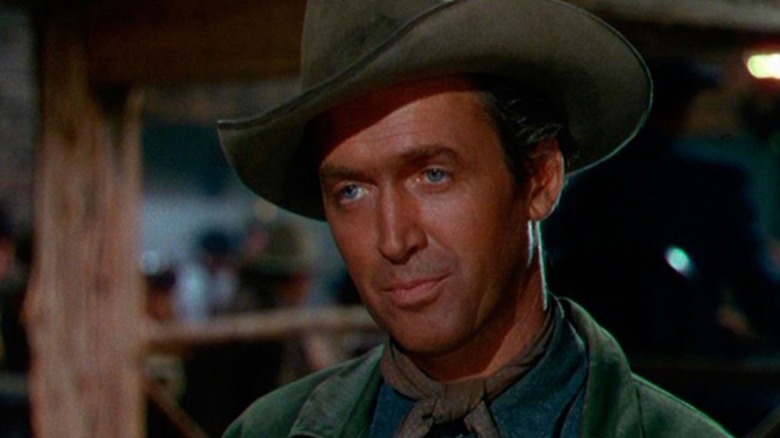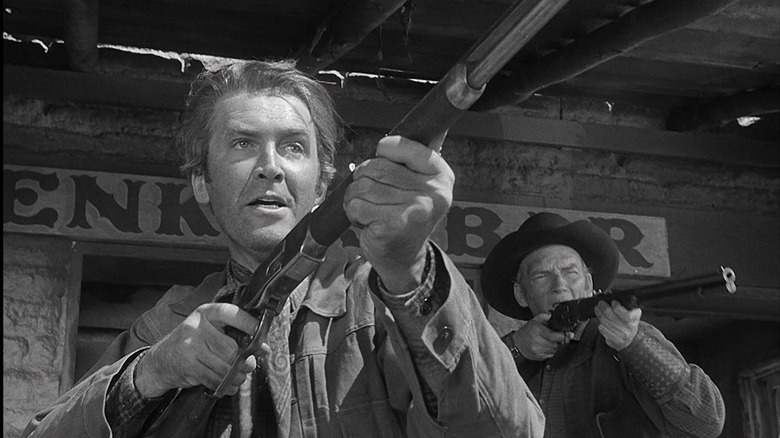James Stewart's Gritty Western Changed Hollywood Salaries In One Major Way
If you've ever expressed even a cursory interest in the entertainment industry, you have almost certainly come across the term "Hollywood accounting." This is the shady corporate practice of manipulating numbers to make sure the people responsible for crafting blockbusters, top-rated television shows, and hit singles never receive the full financial compensation they are owed. What kind of monster would do this? The kind of monster that lives to make money instead of art that can enrich and delight people all over the world. Not all Hollywood executives are like this, but the ones who got into this business because they love using their business expertise to enable (and protect) talented people are watching their ranks get thinned by the day.
In movies, there's always been a push-pull between talent and the money folks. When silent film stars Charlie Chaplin, Douglas Fairbanks, and Mary Pickford teamed with filmmaker D.W. Griffith to form United Artists in 1919, they were reacting to production companies attempting to form a monopoly that could've bent talent to their penny-pinching will. The story of UA going forward is a much more complicated saga, one that ended with a dispiriting whimper (though the zombie company has been revived at Amazon MGM Studios). The creation of UA did, however, presage the multitude of skirmishes that would occur between artists and their ostensible benefactors. And once the studio system was in full swing, one of the biggest stars in town got creative with his contract to ensure that a struggling major could cast him in a couple of Westerns he dearly wanted to make.
In 1950, James Stewart, a square dealer and World War II hero, allowed Universal Studios to make a movie with him at the top of the marquee for a song. All he asked for in return was a share of the net profits — albeit a big share. It was a good deal that, on balance, served both parties quite well. Then the people who valued money over the satisfaction of making a great movie let their inherent greed get the better of them.
James Stewart earned 50% of the profits on Winchester '73
Anthony Mann's "Winchester '73" is a classic, narratively innovative Western. Initially developed as a Fritz Lang film, Universal, which was hemorrhaging money at the time, balked when the "M" director sought to make the film through his own production company. So they turned to Mann, which suited star Stewart just fine as he was a fan of the filmmaker's masterful "The Furies."
There was just one problem: Stewart's asking price in 1950 was $250,000, which would amount to $3 million in 2025. If a studio in 2025 was sweating a $3 million payday to, say, Tom Hanks, we would assume that studio was on the verge of being absorbed by Disney or sold off for scrap. Universal was on the ropes, but Stewart really wanted to make "Winchester '73," so his agent Lew Wasserman (who would eventually run Universal), brokered an unheard-of net profit participation deal that entitled the star to 50% of the film's profits (which were essentially 50% of the gross).
"Winchester '73" was a surprise success that wound up earning Stewart $600,000 ($8 million in 2025 coin). Mann and Stewart immediately signed up for another Western at Universal, "Bend of the River," which was an even bigger hit. Within three years, Stewart had pocketed close to the 2025 equivalent of $20 million, which isn't all that outrageous when you consider Jim Carrey shattered the $20 million barrier with one film ("The Cable Guy") in 1996. But the studios couldn't handle stars receiving pay commensurate with their importance on a given movie, and, thus, Hollywood accounting was born.
And this is why "Forrest Gump," which grossed $678 million against a $55 million budget, has never, as far as Paramount is concerned, turned a profit.

